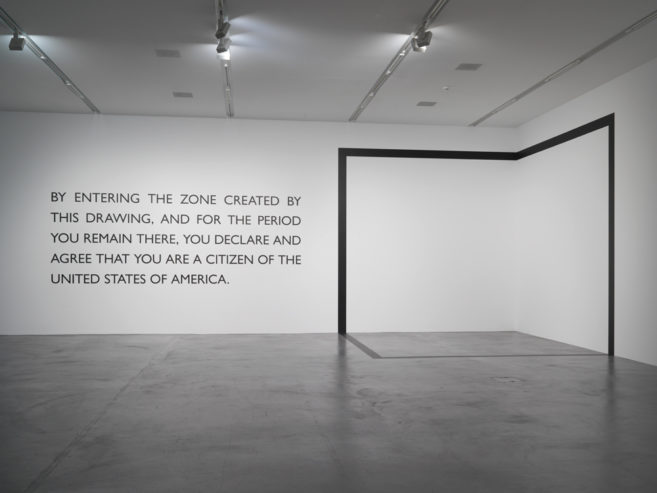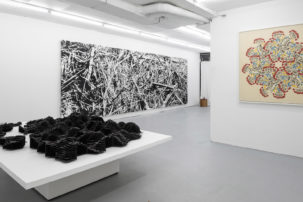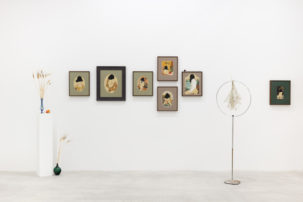In 1967, Austrian artist Waltraud Höllinger legally changed her name to VALIE EXPORT. Spelled out in all capitals and taken from a popular brand of cigarettes, it was a means of resisting patriarchal culture’s use of language to determine, from birth, paternal ownership and identity. This emancipatory gesture served as a conceptual kickoff, so to speak, for what would become a five-decade-long feminist critique—executed through a variety of aesthetic and conceptual strategies—of the social, cultural and technological mediation of bodies. One of the most subtly arresting works on view in “VALIE EXPORT: Research-Archive-Oeuvre” is Body Sign Action (1970), a photograph that shows a tattoo on EXPORT’s upper thigh, of a garter clasp holding up the seam of a stocking. The image documents the artist’s use of the living body, in this case her own, to denounce the imposition of visible and invisible markers of femininity and normative gender identification to which women especially have been historically disciplined to conform. In her 1980s experiments with digitally processed photographs, such as Self-Portrait with Stairs and High-Rise (1989), EXPORT superimposed elements of the built environment onto the image of her face, suggesting that the body bears the weight of the fast-paced changes imposed by a post-Fordist society—the impact of which is mirrored by the depiction of a seemingly fragmented self.
The opportunity to view some of EXPORT’s seminal works is reason enough to visit, but her career-long interrogation of the way identity and behaviour is determined by cultural processes and technological factors is significant, and deserves continued consideration. It’s especially relevant today in light of contemporary activism around the imposition of culturally determined, traditional gender norms, and the ubiquity of social-networking platforms that mediate our sense of self and our relationships to the external world.
Throughout “Research-Archive-Oeuvre,” EXPORT’s contributions to performance, photography and video art are synthesized by way of the artist’s archive, which serves as a curatorial device framing this concise retrospective curated by Sabine Folie, director of the newly inaugurated VALIE EXPORT Center Linz, a research institution dedicated to media and performance art in Linz, Austria. The centrality of her archive is made literal by way of the wall-sized diagram that dominates the exhibition space—a visual and conceptual anchor for the exhibition, which features notes, sketches, letters and other ephemera from EXPORT’s personal files alongside artworks in a variety of media including drawings, video installations and photographs. The chart plots the role of the archive in relation to EXPORT’s own creative process, and even elaborates on its rhizomatic and anarchistic quality, as opposed to the rather contrived narrative offered by a typical museum collection. But it also maps out “the archive” as an object of theoretical inquiry in its own right, tracing its evidentiary value as historical record and its position within aesthetic practice. In this way, Centre Vox offers audiences a rare glimpse, in a rather intimate setting, of the scope of EXPORT’s oeuvre while providing insight into the path that led her to become a pivotal figure in feminist and conceptual media art.







